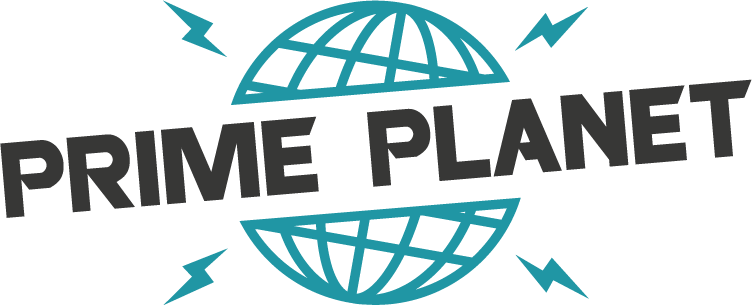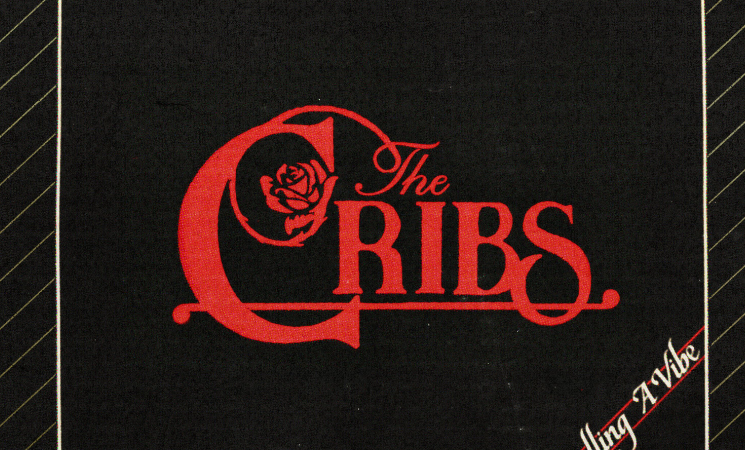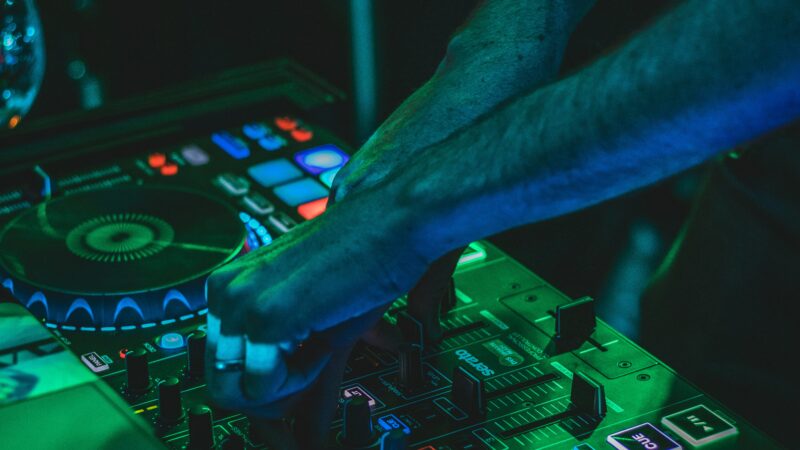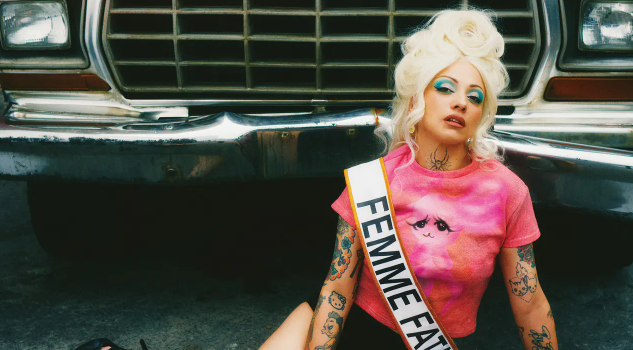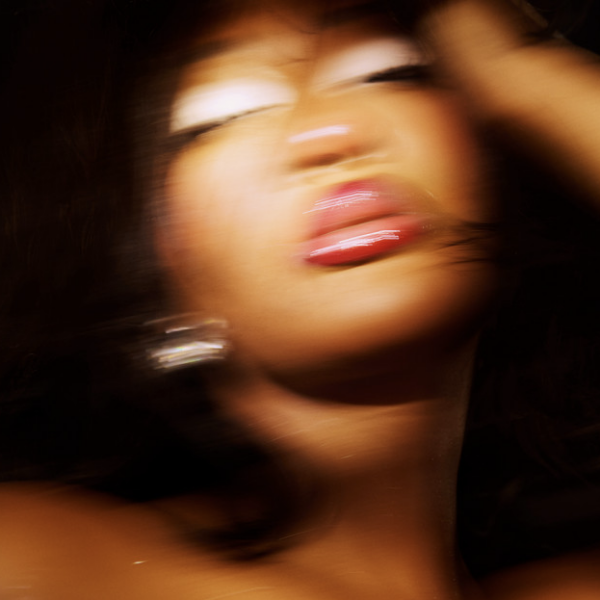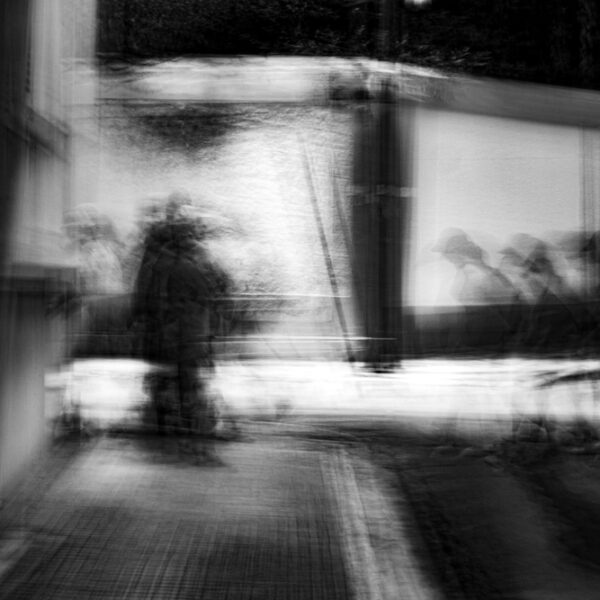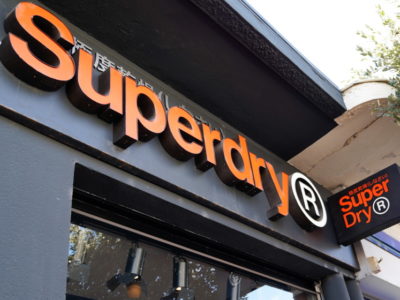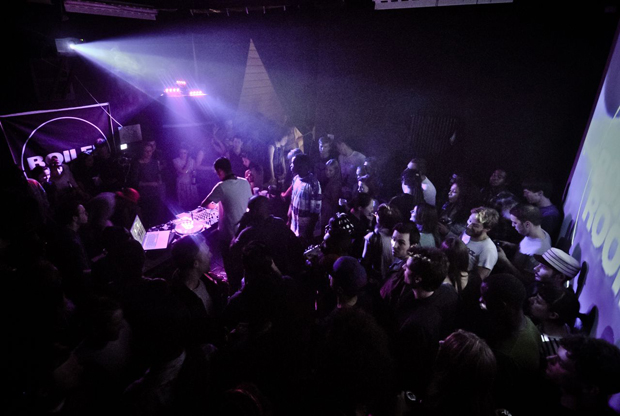
Boiling Point: Boiler Room at 1
A portrait of underground sensation Boiler Room.
It gets hot in the Boiler Room. A heat that drips down the necks of the people present at the weekly Tuesday event at Corsica Studios in London’s Elephant & Castle, that manifests in urgent requests for track IDs and occasional beef in the chatroom, that sparks Twitter shouts of ‘LOCKED’, and that’s evident in the 200,000 monthly viewing figures world-wide from Brazil to Australia. What started as a live mix broadcast online from an old boiler room in June 2010 has now gone global. In less than 18 months the Boiler Room has established itself as a crucial spot for both established legends and rising stars from across the spectrum of underground dance music to play – you’re just as likely to catch reggae don Rodigan giving a sermon about the genre’s roots as Rinse FM DJ Oneman dropping Fleetwood Mac with a big fat grin on his face – and it’s a must-watch for fans wanting to get closer to the music they’re passionate about. In a word, if it’s happening at Boiler Room it’s hot.
7pm, London
Elephant & Castle is bustling with post-work activity: people spilling out of the tube, clambering onto buses, taking their chances at gridlocked moments to dash across the sprawling intersection. Round the back of the train station, down an alleyway that runs adjacent to an empty block of flats awaiting demolition, is music/arts space Corsica Studios. Housed in a railway arch, it’s one of London’s best-loved venues due in part to its raw surroundings. Out the back Boiler Room producer Chalin Bartin and website editor Charles Drakeford are having a cigarette while the staff get the place shipshape. Cloakroom rails are moved outside and the decks are set up with the addition of drum pads and cymbal for James Pants, who’s playing tonight with Daedelus and Cherrystones. Host/director Thristian bPm rocks up a couple of minutes later. The three joke around, check sound levels and make their way out for one last pre-show cigarette. It all feels like a pretty smooth operation, a far cry from the early days when they were operating out of Boiler Room director and entrepreneur-about-town Blaise Bellville’s Hackney Downs warehouse loft. Back then, green to it all and dependent on borrowed equipment, the show could easily run a couple of hours late while favours were pulled to source a missing phono lead.
“The whole idea with the first session was to come down, drink some rum, smoke a little bit and chill out with your mates and broadcast it,” says Thristian. It was an idea that came out of Blaise’s desire to cover music in a different way on Platform, an online magazine covering music and pop culture in a Vice-lite style that he’s since folded to focus on Boiler Room. “We ended up with this idea of using the space opposite our office for people to come and record a mix there to give it a more natural feel,” he explains over the phone a couple of days later. “I called Thristian [bPm, a friend and former colleague of Gilles Peterson] and Femi [Edmund Adeyemi, who went on to launch NTS Radio], two people I was really interested in, and they agreed to do the first one together. A day or so later I watched some Ustream shows for the first time late at night in the office. Oneman and Bok Bok were playing; they were calling them yardcasts at the time. Because the plan with Thristian and Femi was at the front of my mind we just joined the dots quite naturally.” After that first rum-fuelled session, they got a plan together to book some DJs for the next week and “it just went from there”. In the first couple of months the DJs included LA producer Gaslamp Killer, house legend Theo Parrish and London’s own Mount Kimbie. Unsurprisingly interest started growing.
One of the early fans was Boiler Room website editor Charles: “I watched the Hudson Mohawke hip hop set and was so into it. I sent Thristian an email the next day seeing if they needed any help with anything. The reason I wanted to get involved from the beginning is because I’ve always listened to pirate radio and been fascinated by it. There are loads of documentaries about Kool FM and stuff that I’ve watched so many times just because you get a glimpse of what it’s like in the studio. With Boiler Room, everyone can see what’s happening.”
2pm, Vermillion, South Dakota
21-year-old student Bobby Horton has finished class for the day and is on his way home, picking up tacos on the way. He heads straight to his basement where he’ll spend the afternoon glued to Boiler Room, something he’s done most weeks since discovering it through Twitter when London-based producer Jackmaster linked to it. “Usually shows will start between 2-4 pm where I am,” he says. “For the 1st birthday I basically spent 2-8 pm partying in my basement and when it was actually time to go out I was dead tired.” As an aspiring DJ, Boiler Room is a gift to Bobby: “The idea that the club is built around the streaming of the DJ set is something I’ve only ever dreamed of,” he explains. “I basically learned everything I know about DJing through Youtube videos. What I love about Boiler Room is that I get to see a full set and study how each DJ does their thing. It’s cool being able to see the crowd’s reactions; it gives me a good feel of where the vibes are at.” He doesn’t mince his words when it comes to the musical inspiration Boiler Room has given him: “Before Boiler Room I was really over dubstep because here in America it is total shit. I had never even heard any UK grime, dubstep or garage. It opened my eyes to a whole new world of music that is just leaps and bounds better than anything I have ever heard before. I have also started listening to Rinse FM and other UK radio stations because Boiler Room has gotten me so entranced by the UK scene.”
8pm, London
“A lot of people have asked what the relationship is between this new bass sound exploding and Boiler Room bubbling at the same time and I think they’ve just worked hand in hand,” says Thristian as we stand out of back of Corsica in the smoking area as the first people filter into the club. “Talented artists like James Blake, Bullion and Jamie xx would just come down and jam and nobody particularly knew who they were. I remember playing James’s first or second EP, everyone was like what’s the fuck is this? It was just over a year ago. Then him coming down a few months later was just the biggest thing ever.”
The speed with which Boiler Room has grown has taken them all by surprise. “Because I’ve always been behind the camera every Tuesday and I’m never watching it from home, I didn’t really gage how well it had done until about Christmas time,” says Chalin. “I remember googling it for the first time and finding out there was some random pub in Dublin that shows it every week, a Japanese crew that watches us and this Russian crew in the chatroom. ”
Having outgrown the original spot, they started holding the Tuesday sessions at The Pattern Cutting Factory in Dalston, a move that boosted the popularity because anyone could – and did – come down. The vibe was more speakeasy rave than radio show though and, after a couple of out-of-hand nights, it was clear it couldn’t last. “In February we had to think quick because we’d run out of the little cash we had,” explains Blaise. “I’d had conversations with the Red Bull Music Academy before and I picked it up again. Within weeks they’d put together a rescue package for us. But with someone like RBMA we’re looking to them for support, not profit. They’ve support our development in the UK and bits in Europe and next year they’ll be supporting us on a global level. It was the perfect brand for us to work with. Without them we wouldn’t exist; we would have died in March.”
Despite it becoming a popular night in London (it’s free, you just need to get on that much coveted list), Thristian remains clear that Boiler Room is a broadcast. “I see it as an evolution of broadcasting rather than an evolution of club nights,” he says. “People get to come down here and play what they wouldn’t usually get to play in a club.”
Thristian books the acts – who all play for free because it’s a valuable promotion spot – with input from Charles and Blaise. “The guys that get it are usually the ones who do well at that whole Twitter/Facebook hype,” says Thristian, making a very pertinent point – the speed of which Boiler Room has grown has a lot to do with social networking smarts. “We’re open to our audience more than any other club night or even radio show because the chatroom, Facebook and Twitter are so immediate that you can either smash it or flop and you wouldn’t even known until you checked online. The crowd here and at home want to see you have a good time. It’s that houseparty thing: they don’t want to see a stiff DJ who knows each of their tunes inside out and are on a robotic mix.”
2pm, Austin, Texas
“My favourite thing about Boiler Room is getting a sense of the artists energy,” says 35-year-old clothing shop manager and Austin resident Jeni Jacques. “Like Redinho, his charisma was off the charts.” As a fan of The xx, she found out about it when Jamie xx first played the show over a year ago. Since then she’s been a regular and devoted viewer, even downloading the app and listening to every show they’ve uploaded. “If there is someone I absolutely need to see on the Boiler Room I will even take off the afternoon so I can stream,” she admits. When Boiler Room broadcast London label Young Turks’ showcase at this year’s SXSW music festival in Austin, Jeni was there (“It was the best!”) and says that many of the artists she checked out at SXSW this year were ones she’d first seen at Boiler Room. She’s also felt the popularity of the show grow first hand. On a trip to Disneyland earlier this year she wore her Boiler Room t-shirt and a stranger rushed up to say they’d seen Lunice on the Boiler Room and it had been “intense”
10pm, London
Everyone is feeling that intensity tonight. James Pants is decimating the room with his ferocious performance: bellowing into the mic, crashing his cymbal and playing one of the most fun sets I’ve caught at Boiler Room. It’s a complete ride and impossible not to get caught up in the moment, which inevitably means adding to the stream of hype on Twitter. That’s the thing about Boiler Room, whether you’re at the event or watching online there’s this urge to join in: to say you’re there, you’re watching, you’re locked.
A focal, hyper-vocal point for all that energy is the chatroom. As Boiler Room’s producer, Chalin oversees all the broadcasts, produces all the audio and video and keeps an eye on the chatroom during the show. “There are all these little running jokes,” she laughs. “So many funny hashtags. The first one was #greenshirt guy [at the Hudson Mohawke night]; he was schmoozing round the room. I thought it was just the girls that had noticed it. Some of the comments…I don’t like the hating but sometimes you do get some funny people.”
“The chatroom is probably half of the reason I’ll get locked into most Boiler Room shows,” says South Dakota student Bobby. “It’s fun to talk about tunes and discuss the current DJ/musician or whatever. It’s great because if you come in there trying to sound like a know-it-all you immediately get destroyed by the real heads, so it’s humbling and educating at the same time.”
Up in Glasgow 19-year-old student and ALL CAPS label boss Barkat Jit Singh, who DJs under the name Bark, is also a fan of the chat. “It’s one of the reasons I watch it,” he tells me on the phone. “It’s always cool to see people in the chatroom who know the old records; it’s handy to find the old IDs.” Having watched it grow over the last year, he’s getting to do what many Boiler Room fans could only dream of – play it. Hessle Audio’s Ben UFO is a fan of the label he runs with Lewis Roberts, aka Koreless, so asked Bark to play their next session. How does that feel? “I’m pretty nervous,” he laughs.
But for tonight, like every Tuesday, at 11pm it’s all over. People stream out of Corsica Studios and the online chat fades to silence. It’s still just the beginning for Boiler Room though. As well as the London shows, they’ve started doing Berlin once a month and a regular LA session will kick off on 30th November. Where they’ll go from here is yet to be seen but one thing is certain: we’ll be locked.
